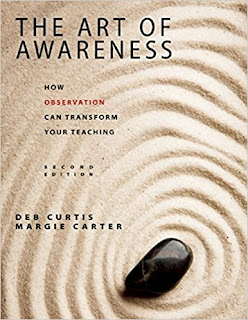We have moved our blog to a new website.
To read this blog and more, please visit:
We no longer are "planning" together necessarily as our children are learning different things at different times. However, there is great value in collaborative discussions, reflections, and conversations with like minded colleagues.
There are many ways that you can come together as a team of course in terms of planning, studying and analyzing documentation, and learning. Something that we adopted as a school team 5 years ago was the idea of a Book Club.
The book club provided us with a common language and focus point to direct our constructive conversations and to move our thinking forward as an educator team. We were able to focus our conversations around what was happening in our own classrooms, yet ground our ideas and conversations in the research and practical examples that we commonly read about in a text.
The beautiful part about it all is how inclusive our book studies became. All of the teachers and early childhood educators were invited to be a part of it. We then extended the invitation to educational assistants, administrators, and special education educators who were connected to Kindergarten. So many perspectives to add to the richness of the conversations!
Our study group provided a safe space for educators to share their thinking, ask for support, and to try new things. It allowed for us to be vulnerable and to have courageous conversations that moved our thinking forward. We believe that grounding conversations in research, provides an opportunity to discuss difficult and challenging things without making it personal.
Our book club changed the culture of team many years and further supported the partnerships in having challenging conversations with each other about different philosophies or opinions. We found that it provided us all with a foundation to try new things and collaborate in a positive and constructive way.
What books did we choose, and why?
Each year we have a conversation and think about one thing we want to get better at, improve on, or learn more about as a team.
We wanted to share the rich texts that we have read. The link above each will provide you with more details on the texts through another link.
In our first year, we wanted to better understand play. What might our different roles be? How can be support the children without stifling play?
The next year, we wanted to study how we could better observe, document and capture learning within our classrooms. We wanted to choose a book that would support us in understanding effective practices in collecting and analyzing information. We were really happy with our choice to read a Margie Carter and Deb Curtis text - it was visual, practical, and helpful!
The following year, we wanted to learn more about Behaviour Management. We had been reflecting on and thinking about proactive ways to support children. We wanted real strategies, but also wanted to understand the theory behind the different choices we were making as educators.
In our 4th year, we focused on technology. Instead of reading a book, we chose different articles about ways to engage with and incorporate technology into our program. Depending on the needs of your group, using multiple articles instead of a book could be an effective approach.
In our 5th year, we chose to zone in on early mathematics. We wanted to understand the trajectories and learning pathways that the young children in our programs were navigating. We chose a really dense, yet rich text by Doug Clements and Julie Sarama. It was a perfect book to dissect and discuss as a team to ensure that our understanding was clear and could be practically applied.
Last year, we chose to focus on self regulation and brain development. We read two different books to develop our understanding and guide our conversations.
When would we host?
Each year we would have a conversation as a team to decide on the best time to host. Some of the educators on our team work until 6pm, so we would often begin at 6 to ensure that everyone was able to be included. Some years we hosted our book study on the same night as a school wide staff meeting.
As a team, you can think about what works best! We found that setting all of the dates in the Fall provided everyone with time to make any necessary arrangements to be present and actively involved.
Protocols and Structure:
Having protocols and structure without our meetings allowed for everyone to be seen and heard. We want to ensure that everyone feels valued and has an opportunity to share during our meetings. Each year we tweak our protocol a bit based on the topic of the book and the ideas of the educators.
One team or partnership will host the meeting each month. They will provide the agenda and the follow up questions or activity.
We read one chapter each month. During our meeting, we each take a moment to share something that stood out to us or challenged our thinking.
When we studied behaviour and self regulation, the hosting team would then share a case study or example for their classroom and we would have a discussion to support their questions or wonderings. This provided a safe space for educators to ask for help or share something that is or is not working for them.
When we studied early mathematics, the team hosting would prepare an activity, a small group learning prompt/question, or a provocation. They would often bring photographs or videos connected to their sharing with real examples of how the children interacted (e.g., what did they say, do, learn?). This provided real and practical things that we could each try within our own classrooms.







No comments:
Post a Comment